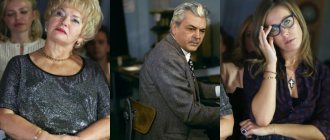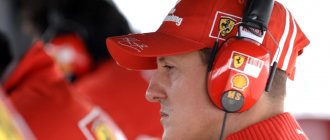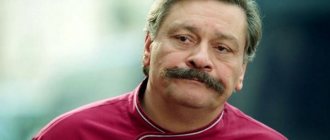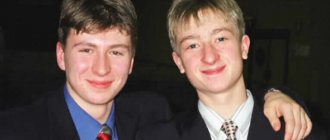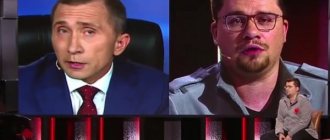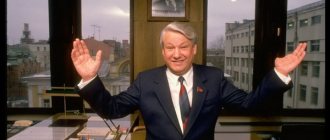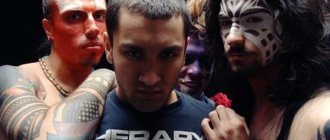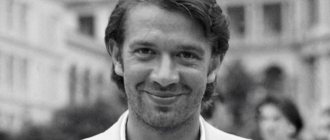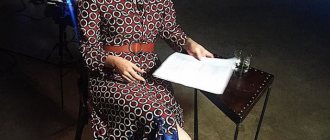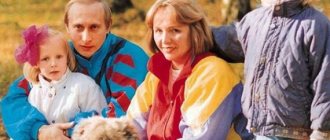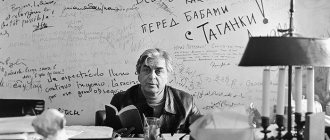Childhood and family of Anatoly Sobchak
Anatoly Sobchak grew up in the family of railway engineer Alexander Antonovich Sobchak.
Due to the father's profession, the family changed their place of residence more than once. Mother, Nadezhda Andreevna Litvinova, served as an accountant. The family had four sons. When Tolya was two years old, his father was transferred to serve in Uzbekistan. There he went to school and received a certificate of secondary education. Anatoly managed to enter the university in the capital of Uzbekistan, Tashkent. He chose the Faculty of Law, but did not study there for long. In his second year, in 1954, he transferred to the city of his destiny - Leningrad. At Leningrad State University, the student was able to become a Lenin Scholar - he turned out to be an attentive, hard-working and talented student. Academic success was not easy for him. Youth and spring love took their toll. Anatoly Sobchak first married during his student years to the bright beauty Nonna Handzyuk. The wife studied at the philological department of the Herzen Pedagogical Institute. Soon the newlyweds were happy with the birth of their first child. Anatoly Sobchak’s daughter from his first marriage, who was named Maria, followed in her father’s footsteps and became a lawyer. Now, in adulthood, she works as a criminal lawyer. The daughter managed to pass on the family talent to her grandson; her son Gleb is studying at the Faculty of Law of the now St. Petersburg State University.
Biography
Anatoly Alexandrovich's family was difficult by Soviet standards. His father went through the Great Patriotic War and was awarded the Order of the Red Star for organizing the crossing of the Frisch Gaff Bay. After the war, he worked as a railway engineer, which is why they often moved and lived in different cities of the Soviet Union. Anatoly Sobchak was Russian by nationality, but the blood of the Czech and Polish people also flowed in his veins.
Little Tolya was born in Chita, but spent his childhood and youth in the city of Kokand, in Uzbekistan. Before the war, my father worked here on the railroad, and my mother was an accountant. When Alexander Antonovich was taken to the front, his mother remained the head of the family, consisting of two old grandmothers and three children. In total, the couple had four sons.
The life of Anatoly Sobchak in his early years was difficult. Even children had to work, despite the sweltering heat in summer and the terrifying cold winds in winter. The boy very quickly realized that there was no place for him here, and while still at school he decided that he would go to study in Leningrad.
Legal experience of Anatoly Sobchak
When Anatoly Sobchak received his diploma, he and his family were assigned to the Stavropol Regional Bar Association, where he served for three years. He started as a lawyer in the town of Nevinnomyssk, then rose to become the head of a legal consultation.
Anatoly Sobchak and Vladimir Putin
The experience allowed him to think about more, and in 1962 Anatoly Sobchak went to Leningrad, where he entered, and three years later he successfully completed graduate school, defending his Ph.D. thesis. In 1965, now Anatoly Aleksandrovich Sobchak began giving lectures to students of the Leningrad Special Police School of the USSR Ministry of Internal Affairs. Receives the scientific title of associate professor and in 1968 moves to the position of associate professor at the Leningrad Technological Institute of the Pulp and Paper Industry, where he continued to work until 1973.
Over the years of work as a teacher, Anatoly Aleksandrovich wrote more than 200 books and scientific articles on economics and law, flawlessly confirming his right to academic degrees. In 1982, he defended his doctoral dissertation and continued to work as a professor at the Law Faculty of Leningrad State University. He created and headed the first department of economic law in the USSR. Over the years, his first family broke up and a new one was born. In 1980, Anatoly Sobchak married Lyudmila Narusova. The bride had a PhD in historical sciences and was an assistant professor in the department of Russian history at the Academy of Culture. In his second marriage, a daughter, Ksenia, was born.
Anatoly Sobchak - the first mayor of St. Petersburg
While the scientific career of the future first mayor of St. Petersburg (still Leningrad) was developing successfully, global changes were already brewing in the country. In 1989, the first democratic elections were held, and by the will of Leningraders, Anatoly Alexandrovich received the mandate of People's Deputy of the USSR in the 47th electoral district of Leningrad. This district includes the famous Vasilyevsky Island. He immediately, at the very first congress, became a member of the Supreme Council, the Committee on Legislation and Law and Order. He became the chairman of the parliamentary commission to investigate the tragic defeat of the rally by troops on April 9, 1989 in Tbilisi. An interregional deputy group was organized to clarify all the details.
About errors
Valentina Matvienko, Chairman of the Federation Council of the Russian Federation: “Did Sobchak make mistakes? Were. After all, as you know, only those who do nothing make no mistakes. And Anatoly Aleksandrovich and his team faced a huge pile of problems - both those left over from the previous time and new ones. Such is the fate of all pioneers. The main thing is that he and his team initially correctly determined the content of the reforms and the direction of the country’s development. This is a great merit that no one will ever be able to cross out.”
Boris Petrov, General Director of the St. Petersburg TV channel : “Sobchak was a completely extraordinary person, he did a lot for the city, but as a politician he outlived his time, because the time for revolutionary achievements is very short. He was a public politician and, in essence, to a lesser extent an organizer and business executive, he himself understood this. At the same time, he never renounced his opinion and never publicly changed it.”
Personal life of Anatoly Sobchak
Anatoly Sobchak perhaps moved more and more away from his family and devoted more and more energy and time to solving public affairs. On June 12, 1991, he was elected the first mayor of the city - now - St. Petersburg. It was under him that the city’s historical name was returned. As mayor of the country's second city, Sobchak was a member of advisory councils under Presidents Mikhail Gorbachev and Boris Yeltsin, and headed the Constitutional Council, whose work was the new democratic Constitution of Russia.
Young Anatoly Sobchak with his daughter Ksyusha
Anatoly Sobchak knew how to see talent in those around him and did not block their path, but helped them find their way. Many of the first team now hold government positions in Moscow. Under this mayor, St. Petersburg became a European city, investments began to be attracted to it, and it once again justified its status as a cultural capital. In 1994, the Goodwill Games were held in St. Petersburg, it became a city of festivals, forums, conferences...
Father-destroyer Sobchak through the eyes of his students - 20 years later
What's closed
All office buildings “with downtown offices” must close June 1, as directed by the California Workforce Management Agency. The California Department of Justice has ordered the closure of prosecutors' offices in Sacramento, Oakland, San Francisco, Los Angeles and San Diego. Offices will be closed, although employees are encouraged to work from home if possible. Also throughout the country, large hypermarket chains Walmart and Target were temporarily closed in areas of unrest.
In the bunker
The day before, the New York Times reported that Donald Trump and his family took refuge from protesters in a bunker under the White House on Friday. The bunker was last used by US Vice President Dick Cheney on the day of the disaster on September 11, 2001. Social networks are actively circulating posts with the hashtag #BunkerBoy (English: “boy from the bunker”). The White House does not comment on the information.
Protests at the White House
Sunday evening's protests in front of the White House began relatively peacefully as a crowd of thousands gathered in Lafayette Park. Earlier in the day, demonstrators marched through the city center chanting “George Floyd! Say his name! and “No justice! There is no peace!
As the 11 p.m. curfew approached, the degree of confrontation between protesters and police increased. The demonstrators stood in front of a line of several hundred police officers, supported by National Guardsmen. The lights that illuminated the north side of the White House, which served as a backdrop for the confrontation between protesters and police, were turned off. Usually they are turned off only when the president dies, which many Americans did not fail to discuss on social networks.
At 11 p.m., a line of police in front of the White House moved forward with tear gas through Lafayette Park, pushing back protesters. Fires started in the city. Heavy smoke was observed several blocks from the White House.
Protests in other cities
In Cincinnati, the US flag was lowered at the police headquarters and a black and white flag with a blue stripe was raised. The blue color represents police officers, and the black color represents police officers killed in service.
One person died in Louisville early this morning after police officers and the Kentucky National Guard "returned fire" on a group of protesters, Gov. Andy Beshear said. Beshear said Kentucky State Police will "independently investigate this incident."
On the weekend
As of May 31, the National Guard was introduced in 21 US states. These states are California, Colorado, District of Columbia, Florida, Georgia, Illinois, Kentucky, Massachusetts, Michigan, Minnesota, Missouri, Nebraska, Nevada, North Dakota, Ohio, Pennsylvania, South Dakota, Tennessee, Texas, Utah, Washington, Wisconsin. Protests broke out in 120 cities across the country. This is the largest protest in the country since the summer of 1967, when riots against racism broke out in 159 US cities.
On May 31, few people disobeyed the curfew in Minneapolis, where the main gathering place remained the street where Floyd was arrested and killed on May 25, and where a spontaneous memorial with flowers now formed. In the evening, police forcibly cleared the area of demonstrators. Earlier on the highway, a semi-trailer drove into a crowd of protesters, but no one was injured.
In New York, thousands of protesters spread out across the city and at one point briefly blocked the Manhattan Bridge. Protesters threw trash at police, and officers responded by beating the crowd back with batons and making arrests.
The 25-year-old daughter of New York City Mayor Bill De Blasio was among the protesters arrested on Saturday. As reported by the media, the New York police union published information on its Twitter page about the arrest of Chiara de Blasio.
Across the country, police used tear gas, pepper spray, rubber bullets and batons against demonstrators and the press. In Denver, police hit a Denver Post reporter several times even though he shouted that he belonged to the press. At the same time, photos of police officers marching with demonstrators and kneeling in memory of victims of police brutality appeared in several cities.
Finding the guilty
Trump considers the organizers of the protests to be the left-wing association Antifa, which he promised to recognize as terrorist in the country, and refuses to make an address to the nation. At the same time, former national security adviser in the administration of former US President Barack Obama, Susan Rice, in an interview with CNN, admitted Russia's involvement in the unrest during the protests.
Harassment of Anatoly Sobchak: three heart attacks
However, not everyone liked the policies of the first mayor, and by the time of the second elections an opposing coalition had formed. The prosecutor's office, the Ministry of Internal Affairs, and the special services did not find any advantages in the work of Anatoly Sobchak. In the next election, his opponent received 1.2 percent more votes. Denigrating publications in newspapers began about Anatoly Sobchak, as well as about his family, and a corruption case was opened. At this time, Anatoly Alexandrovich’s health began to deteriorate. He continued to be called in for questioning. On October 3, 1997, he was supposed to testify in a corruption case, but a pre-heart attack sent him not to prison, but to the hospital. For another month, the former mayor was treated after a heart attack in the cardiac intensive care unit of the 122nd medical unit. A third heart attack occurred. He was transferred to the Military Medical Academy, from there on November 7, 1997 he flew to France...
Funeral of Anatoly Sobchak
In Paris, Sobchak not only received treatment, he continued to teach, wrote books, and spent a long time in the archives. However, despite persecution at home and repeated warnings from friends, he decided to return to Russia.
Anatoly Sobchak arrived in St. Petersburg on July 12, 1999. In October of this year, he was officially notified that the criminal case against him for corruption had been dropped. Sobchak could not become mayor again - 1.2 percent of the votes were missing. In 2000, he became a confidant of Russian presidential candidate V.V. Putin. He was traveling to Kaliningrad on business, but didn’t have time. Anatoly Aleksandrovich Sobchak died on February 20, 2000 in Svetlogorsk, Kaliningrad region. Thousands of people came to see off the first mayor of St. Petersburg on his last journey; the Tauride Palace, reserved for the mournful ceremony, could not accommodate everyone. The grave of Anatoly Sobchak can be honored at the Nikolskoye cemetery of the Alexander Nevsky Lavra.
Personal life
Anatoly Sobchak, a biography whose personal life still interests many people today, was married twice. He met his first wife Nonna in Kokand. They got married when Sobchak was a student. His wife lived with him during the most difficult years of his formation, poverty, and homelessness. They lived together for more than 20 years. The second wife, Lyudmila Narusova, supported her husband in his political ambitions. She herself implemented several public projects in St. Petersburg and held several different positions at the mayor’s office. Sobchak was so bright and charismatic that women were very drawn to him. Even when he worked as a teacher, students often wrote him letters with declarations of love. Rumor attributed him with many novels, right up to Claudia Schiffer. He himself only chuckled in response.
